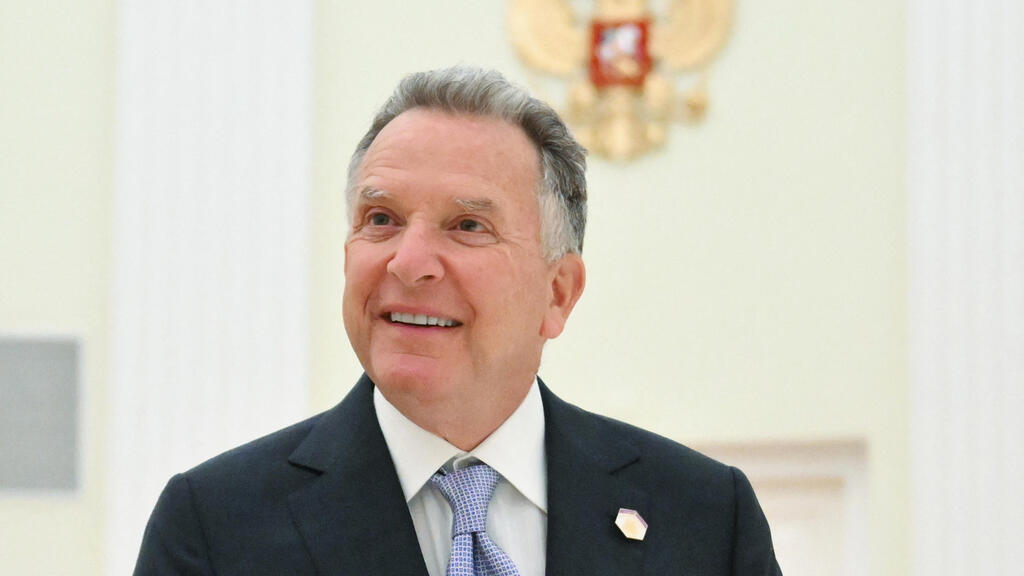Iranian Foreign Minister Abbas Araghchi approached President Donald Trump’s envoy, Steve Witkoff, and requested to conduct direct negotiations with the United States on nuclear issues, Ynet has learned. The move comes against the backdrop of Tehran’s disappointment with Omani mediation and its desire to hold direct talks with the U.S. However, if direct negotiations are ultimately not agreed upon, the option of Norwegian mediation is being considered.
According to reports on Tuesday, the fourth round of talks between Iran and the United States is expected to take place over the weekend—likely in Muscat, the capital of Oman. Iranian state media reported that the talks may resume as early as Sunday.
An Iranian source close to the negotiation team told Reuters that the date has not yet been finalized, and that the talks are expected to take place over two days in Muscat, “either Saturday and Sunday or Sunday and Monday.” The fourth round of talks was originally planned to take place in Rome last Saturday, but was postponed, reportedly due to “logistical reasons,” according to officials in Oman.
2 View gallery


The US and Iran could hold direct nuclear negotiations
(Photos: CameraObscura82/Shutterstock; Smolkov Vladislav/Shutterstock; Mohammed Yassin/Reuters, Iranian Leader's Press Office, Mandel Ngan)
Strategic Affairs Minister Ron Dermer currently is in Washington for meetings, including one with Witkoff, Trump’s envoy who is leading the engagement with Iran. Witkoff also stated that Washington is working to hold the upcoming round of talks this weekend, a day after Iran’s Foreign Ministry reaffirmed Tehran’s commitment to diplomacy with the U.S.
Meanwhile, Russian President Vladimir Putin spoke on Tuesday with Iranian President Masoud Pezeshkian about the progress of the talks between Washington and Tehran. According to the Kremlin, Putin said that “Russia is prepared to facilitate dialogue between Iran and the United States in order to reach a fair agreement.”
<< Get the Ynetnews app on your smartphone: Google Play: https://bit.ly/4eJ37pE | Apple App Store: https://bit.ly/3ZL7iNv >>
Overnight, Trump addressed the Iran issue. “We want Iran to be a successful country. We don’t want to do anything that blocks that path. But they cannot have nuclear weapons," he said, and warned that “If they choose to go a different path, it will be a very sad thing. It’s something we don’t want to do, but we’ll have no choice. They’re not going to have nuclear weapons. They’re not going to have nuclear weapons. Do you understand me?”
He added: “We’re talking with them about many things right now. This is really a decisive time, I would say, for Iran and their country. It’s a very important time for Iran. This is the most important time in Iran’s history, and I hope they’ll do the right thing. I’d love to see a peace deal—a strong deal. They can’t have nuclear weapons, but I’d say this is the most important period in Iran’s long history, and we want it to be a prosperous country.”
Trump announces that the US will halt attacks on the Houthis
(Video: Reuters)
On Tuesday, Trump surprised observers when he announced—just hours after the second Israeli airstrike in Yemen in 24 hours—that the U.S. would immediately halt its bombing campaign against the Houthis. He claimed that “the Houthis don’t want to fight” and that the U.S. government “will take their word for it that they won’t blow up ships.” According to the American president, the decision to stop the strikes in Yemen came after the Houthis agreed to cease interfering with critical shipping lanes in the Middle East.
CNN reported, citing sources, that Witkoff worked over the past week to achieve a ceasefire with the Houthis. They added that the talks were mediated by the Omanis, who have previously served as regular intermediaries between the U.S. and the Houthis. Sources familiar with the matter told CNN that Trump’s announcement followed “a flurry of diplomatic activity” in recent days between the U.S., Oman and the Houthis. According to them, the understanding between the U.S. and the Houthis not to carry out further attacks is intended to “build momentum” for the nuclear agreement talks with Iran. For now, the timing of the fourth round of talks between Washington and Tehran remains unclear.
On Saturday, The Washington Post reported that one of the reasons for the dismissal of White House National Security Advisor Mike Waltz was that he held “intensive contacts” with Prime Minister Benjamin Netanyahu regarding military action in Iran, just hours before the Trump-Netanyahu summit. Netanyahu denied the report, writing on his X account that “the prime minister did not have ‘intensive contacts’ with Waltz.”
According to the report, the president had “slowly built up frustration” with Waltz, who was seen as hawkish and eager to use military force. The advisor clashed with senior administration officials over military issues—especially over whether to take military action against Iran.





